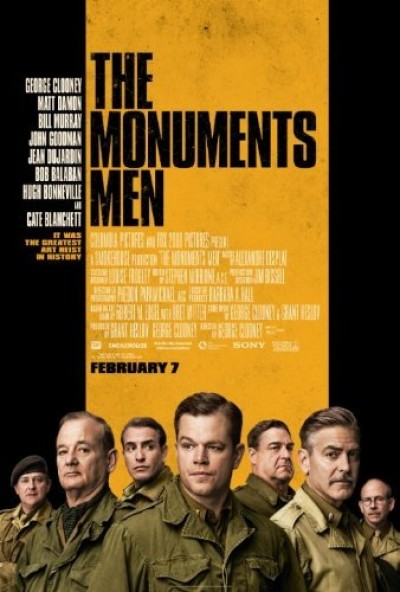“Present company expected”
There was real potential for George Clooney‘s The Monuments Men to turn into a broad comedy about a hapless band of seven working their way through Europe in search of the stolen masterpieces Adolf Hitler hid away for his own personal collection of greed. It had the hokey score sounding like a vintage WWII newsreel, threatening to show each actor mugging for the camera while looking just beyond the lens with a huge, infectious smile; over-the-top performances straight out of the 50s complete with dated cadence; jokey dialogue call backs; and a trio of stereotypical villains who just happened to be the bad guys of note at every turn, joined by music cues and slow, dramatic reveals. Despite all that, though, Clooney still wanted to make sure he didn’t simply belittle his serious subject matter with cheap laughs.
Well, he shouldn’t have put so many in if that was the case because the end result becomes a tonal nightmare swinging back and forth from start to finish. I’m not sure what voice was used in Robert M. Edsel and Bret Witter‘s original novel, but Clooney and writing partner Grant Heslov seemed intent on creating a bit of a farcical look a la “Hogan’s Heroes” when dramatic gravitas wasn’t around to calm things down into an emotionally resonant eulogy. It’s therefore unsurprising that the film’s move from prime, Oscar season placement to a dump month like February was caused by the filmmaker’s inability to find a balance with the levity meant to soften what proves to be an ultimately harrowing adventure despite the ridicule these titular men faced from the soldiers they followed into Germany.
It’s inspired by a true story after all, so you need to pay respect to the men who fought to save these artworks still heralded to this day. They don’t all make it back to the States, they’re unable to recover all the stolen masterpieces, and they meet adversity pretty much everywhere they go—hardships that earn them the title of “heroes”. Europe was still a warzone when their aging cultural icons left their families to do something of which few people truly understood the significance. They willingly followed their leader Lieutenant Frank Stokes (Clooney) with nothing more than a friendly smile whisking them off to boot camp in a cheesy montage introduction to their goofily well-meaning tastemakers tasked to combat the Nazi’s hubris and Russia’s thieves stealing the stolen works as reparation for human loss.
But here is where the film falls apart: Clooney is very good at directing drama. You see it in his undisputed masterwork Good Night, and Good Luck, his political thriller The Ides of March, and to some extent his fictionalized account of Chuck Barris’ spy life in Confessions of a Dangerous Mind. It’s the latter’s construction that The Monuments Men should have adhered to more closely, a piece littered with laughs yet without a false note. It was a drama populated by humorous characters and situations allowing the performances to give it an edge of biting wit rather than blunt jokes in deadpan pausing to let us laugh. At many times during this little known WWII story you feel like you’re being led by the hand and told what to feel rather than naturally evolving towards it yourself.
And it only gets more disappointingly frustrating when he lets the drama exist on its own to illuminate its missed potential. There is a brilliantly orchestrated scene where the comic relief pairing of Bill Murray (architect Richard Campbell) and Bob Balaban (art connoisseur Preston Savitz) begin a heartfelt sequence of love and longing as the former breaks down in the shower listening to the record his grandchildren pressed and sent from America courtesy of the latter playing it over the camp loudspeaker. Pair this authenticity with a memorable moment of helplessness between John Goodman(sculptor Walter Garfield) and Jean Dujardin (designer Jean Claude Clermont) as well as the reclamation of dignity by drunkard Donald Jeffries (Hugh Bonneville) protecting Michelangelo’s Madonna in Bruges and you wonder what could have been if Clooney stayed clear from the laughs.
That’s not to say it isn’t funny. The humor simply becomes so over-powering at times that it begs you to remove yourself from the tragedy of WWII to—for lack of a better term—”have fun”. That’s all well and good except for the fact Clooney wants the exact opposite one scene later when someone dies, paintings are burned, or a race against time commences. Only one hybrid instance of dramedy works fully and it’s a result of Murray and Balaban’s perfectly dry demeanors. It begins like a moment of newfound allegiance, turns to one of knowing trepidation at our recognizing the owner of the house they’ve been invited into, and deftly evolves into a serious display of good versus evil before getting punctuated by a hilarious bit of parroting from two young boys declaring “Heil, Hitler!”
If only Clooney and Heslov could have bottled that subtlety for the duration this could have been as great as we hoped when the trailer released last year. Instead we wade through the good (Cate Blanchett‘s untrusting French resistance fighter softening towards Matt Damon‘s Met curator to save the day, Jan van Eyck’s Ghent Altarpiece, and the aforementioned Madonna); the powerful (two Monuments Men deaths and any display of the stakes at hand despite the mission’s “frivolous” nature); and the misjudged (the physical humor of Damon’s James Granger stepping on a landmine, screeching all momentum to a halt). We try to reconcile historical resonance with the cheap jokes in an obviously compressed narrative, but ultimately feel let down. It’s too bad the tonal problems weren’t caught at the scripting stage rather than after shooting had completed.
Score: 6/10
Rating: PG-13 | Runtime: 118 minutes | Release Date: February 7th, 2014 (USA)
Studio: Columbia Pictures / Sony Pictures Releasing
Director(s): George Clooney
Writer(s): George Clooney & Grant Heslov / Robert M. Edsel and Bret Witter (book)

